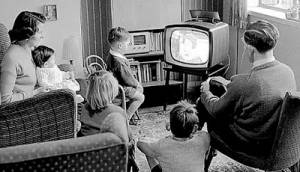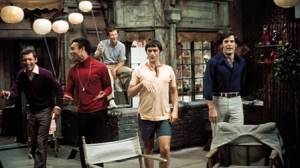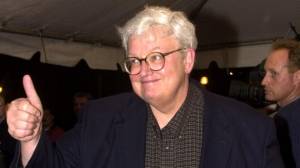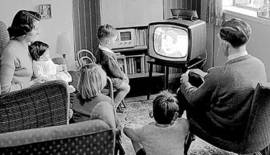 Growing up as a fat, gay kid in a bleak, small town in East Central Illinois, there was little joy to be found. While other boys seemed to naturally gravitate towards sports and rowdy play, I was content watching the old black-and-white films starring Bette Davis, Joan Crawford, or Humphrey Bogart, which were broadcast by the big city independent channels our antenna could pick up when the weather wasn’t bad. The outside world came into my life through sporadic spasms of broadcast from the four television channels our television could receive, my father’s subscription to Newsweek, and the fleeting hope of one day leaving my small town and finding someone I could relate to. Access to information was not at the tip of my iPhone growing up, so my longings were vague and undefined at best.
Growing up as a fat, gay kid in a bleak, small town in East Central Illinois, there was little joy to be found. While other boys seemed to naturally gravitate towards sports and rowdy play, I was content watching the old black-and-white films starring Bette Davis, Joan Crawford, or Humphrey Bogart, which were broadcast by the big city independent channels our antenna could pick up when the weather wasn’t bad. The outside world came into my life through sporadic spasms of broadcast from the four television channels our television could receive, my father’s subscription to Newsweek, and the fleeting hope of one day leaving my small town and finding someone I could relate to. Access to information was not at the tip of my iPhone growing up, so my longings were vague and undefined at best.
My search for belonging proved a longer wait than I had initially thought. As I reached adolescence and young adulthood, my world broadened and changed. College was an uneasy entrance into a more diverse, but still confusing world of normativity and uniformity. I was still surrounded by small town choices in a world that I knew had to offer more, and when I was confronted with opportunities to expand my world, the foreign nature of these glimpses of what my life could be was so against what I had experienced that I was too terrified to pursue or taste it. I settled for the media expanding my world vicariously, and my longing for a familiar life that included my views and attitudes continued. There was a hunger for identity and belonging that caused me more than a little frustration and depression. With a fear of always remaining an outsider, I reluctantly complied with the roles that life around me provided, but I was never really comfortable in the suburban model of happiness that was presented in my limited exposure to life and its role models.
Siskel and Ebert at the Movies and the advent of cable television made my world exploded. Suddenly, options were everywhere, and my sense of community was a remote control touch away. Roger Ebert and his partner Gene Siskel reviewed films on a weekly basis that both intrigued and encouraged me to seek a better life. These critics not only reviewed the mainstream cinema of my youth, but also exposed this small town boy to independent and foreign cinema. Their love of cinema and Ebert’s fearlessness to review films with controversial and dark themes showed me  that others existed who saw the world with similar eyes. On his recommendations, I was exposed to William Friedkin’s adaptation of Mart Crowley’s The Boys in the Band (pictured right), Gus Van Sant’s My Own Private Idaho, and the works of John Waters. His reviews offered me hope and exposed all of us to a more diverse and complex universe than we saw from our front stoop on a drowsy summer evening.
that others existed who saw the world with similar eyes. On his recommendations, I was exposed to William Friedkin’s adaptation of Mart Crowley’s The Boys in the Band (pictured right), Gus Van Sant’s My Own Private Idaho, and the works of John Waters. His reviews offered me hope and exposed all of us to a more diverse and complex universe than we saw from our front stoop on a drowsy summer evening.
Whether intentionally or not, Roger Ebert changed my life and the lives of others through expanding how we view the art of filmmaking. His love of film was evident in his harsh criticism of those films he felt insulted us and his worshipful praise of those he felt made us better than we were before viewing them. The arts of acting, directing, and filmmaking were his church; and this is an altar I have always been  comfortable kneeling before. Along with expanding our understanding of an appreciation for film as an art form, he gave us examples of art that challenged us, moved us, and broadened our worldview. Roger Ebert said, “We must try to contribute joy to the world. That is true no matter our problems, our health, our circumstances. We must try. I didn’t always know this and am happy I lived long enough to find it out.” His long battle with cancer made him a man of reflection and gave him an opportunity to share his thoughts about what a man’s legacy should be. Though I never met him, he has indeed influenced my life for the better, and he will be missed. We’ll see you at the movies, Roger!
comfortable kneeling before. Along with expanding our understanding of an appreciation for film as an art form, he gave us examples of art that challenged us, moved us, and broadened our worldview. Roger Ebert said, “We must try to contribute joy to the world. That is true no matter our problems, our health, our circumstances. We must try. I didn’t always know this and am happy I lived long enough to find it out.” His long battle with cancer made him a man of reflection and gave him an opportunity to share his thoughts about what a man’s legacy should be. Though I never met him, he has indeed influenced my life for the better, and he will be missed. We’ll see you at the movies, Roger!








